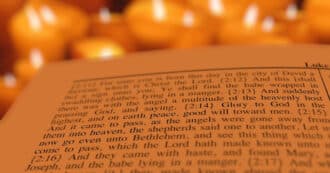The Rev. Dr. Leah D. Schade
Here are ideas for reading and preaching Psalm 96 and 97 which are assigned in the Revised Common Lectionary for Christmas Eve and Christmas Day. This is part of the EcoPreacher 1-2-3 series to equip pastors and congregations to engage the Bible through an ecological lens.
Psalms 96 and 97 depict Earth has having agency, voice, and . . . dance. Dance? Yes! The Hebrew word for “tremble” in Psalm 96:9 and 97:4 can also mean dance, sing, and rejoice. This is a wonderful image of Earth rising up in celebration as the angels announce Jesus’s birth!
Focus on Psalm 96:11-13:
11Let the heavens be glad, and let the earth rejoice; let the sea roar, and all that fills it; 12let the field exult, and everything in it. Then shall all the trees of the forest sing for joy 13before the Lord; for he is coming, for he is coming to judge the earth. He will judge the world with righteousness, and the peoples with his truth.
Eco-Exegesis
Eco-exegesis is a method of interpreting the biblical text through a green lens using the principles of ecological theology. For this passage, we turn to Deep Calls to Deep: The Psalms in Dialogue Amid Disruption by William P. Brown (Nashville, TN: Abingdon Press, 2021).
It is stunning to see the Psalmist address Earth directly in Psalms 96 and 97 as an entity that is capable of singing (96:1-2), blessing God (v. 2), and even preaching (v. 2-3). No wonder these Psalms are designated for Christmas Eve and Christmas Day when Christians celebrate the birth of the Christ child. In the Gospel of Matthew, Earth proclaims Jesus’s birth through the rising of a star. In Luke, animals are present in the fields when the angels appear to the shepherds, as well as in the stable where the child is placed in a feed trough. All Creation celebrates Jesus’ birth!
The angels declare, “Glory to God in the highest heaven, and on earth peace among those whom God favors!” (Luke 2:14). What does it mean for there to be peace on earth? This is hard to imagine as we see evidence all around us that humans have, in fact, done everything but engage in peace.
In his book, Deep Calls to Deep, Rev. Dr. William P. Brown, Professor of Old Testament at Columbia Theological Seminary, explains, “As the earth is populated by the peoples, it is also populated by its natural elements: the sea (and all therein), the lands, and the trees, all of which respond with the raucous ‘roar’ of praise (96:11-12)…With the roar of praise, however, also comes the call for justice and righteousness in Psalm 97 (vv. 2, 6, 8, 11, and 12).” In other words, “As vividly conveyed in [these] enthronement psalms, the scope of divine justice includes all of creation…With the world firmly established, so justice is established. The result is an eruption of creation’s praise” (319).
What would it mean for peace to be not just on Earth, as if it were just a stage for the human salvation drama, but actually with Earth? What would it mean for us to be partners with Earth in bringing about this peace? Can we imagine the heavens being glad because air pollution has ceased? Can we imagine the seas roaring with life because the plastics and garbage have been removed? How about fields exulting because they are protected from “development” in the form of shopping malls or oil and gas rigs? What would it look like for the remaining trees of the Amazon rainforests to sing for joy, knowing that they are being preserved?
For Christians, the birth of Jesus is the revelation of divinity within the earthy, fleshy body of a vulnerable child. This birth is a sign unto us that the Earth itself is rising up and responding to God’s call for justice and righteousness. Curiously, v. 11 in Psalm 97 the original Hebrew language paints an image not just of light dawning, but of light as a seed planted. This tells us that though we have sinned and broken God’s covenant again and again, God is also working within this flawed humanity for righteousness and justice to be planted like seeds of light within us, shining within a world shadowed by corruption and destruction.
1. Eco-Idea
The Eco-Idea is one succinct statement that tells us who God is and/or what God does in relation to Creation and how we should respond as people of faith. The Eco-Idea for this passage is:
Because God has created the Earth to sing, preach, worship, dance, and rejoice, our efforts to protect and restore this damaged planet fulfill the Christmas angel’s declaration of “peace on Earth.”
2. Eco-Questions
Eco-Questions are what we can ask to help a congregation draw out the implications of the Eco-Exegesis and Eco-Idea.
- What local indigenous communities, environmental groups, and community organizations can your congregation work with to protect existing natural lands and replant clear-cut forests? How can your congregation support these efforts of “planting the light”? Can you designate a special holiday offering to support their efforts? Encourage volunteers to work with them?
- Since Psalms 96 and 97 remind us that justice for people and justice for Creation are integrally related, what are actions that your congregation can take to support ecological justice? What environmental problems are most threatening to the children in your community? In what ways can we advocate for clean air, water, and land to protect infants and children who are as precious as the holy child in the manger?
3. Eco-Actions
Eco-Actions are ways that a congregation might respond to the Eco-Idea and Eco-Questions. One of these possibilities may have salience for your ministry context.
- In the Psalmist’s spirit of calling on Earth to rejoice in God the Creator, organize a local outing to a nearby natural area during the holiday break. This can be a multi-generational activity and provide families with a robust engagement with nature while children are out of school.
- Visit ecoAmerica’s Blessed Tomorrow and Climate for Health to learn about ways your congregation can advocate for climate solutions that lift up the Psalmist’s vision of a healthy and sustainable Earth thriving with abundance and equity.
- Create an insert for Christmas Eve and Christmas Day bulletins that includes a list of ideas for “Healthy Earth, Healthy Church” for the coming year. Designate a Creation-care theme for each month, such as protecting the waters of baptism for January, purchasing fair-trade chocolate for February, and trying a meat-free March, for example.
* Featured image source





